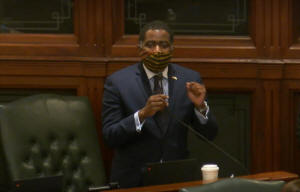Session Recap: Union-backed wage theft measure will head to Pritzker
 Send a link to a friend
Send a link to a friend
[April 15, 2022]
By JERRY NOWICKI
Capitol News Illinois
jnowicki@capitolnewsillinois.com
 SPRINGFIELD – A major initiative of a
regional carpenters’ union that aims to end wage theft in private
construction projects will head to Gov. JB Pritzker. SPRINGFIELD – A major initiative of a
regional carpenters’ union that aims to end wage theft in private
construction projects will head to Gov. JB Pritzker.
The long-debated measure allows a worker with a wage theft or fringe
benefit grievance against a subcontractor to sue the primary contractor
to rectify the situation. The primary contractor is the entity that
deals directly with the customer and hires the subcontractors to
complete a project.
The bill also requires the subcontractor to compensate the primary
contractor for any wages, damages, interest, penalties or attorney fees
should the primary contractor be forced to rectify a wage theft claim.
“Construction jobs are unique in that they often feature various
subcontractors under one general contractor whose job it is to make sure
all laws, including wage-related ones, are being followed,” the bill’s
sponsor, Sen. Cristina Castro, D-Elgin, said in a statement. “This
measure will ensure that the hardworking individuals who are employed by
subcontractors receive fair compensation should that subcontractor fail
to pay them.”

The measure, House Bill 5412, cleared the Senate on Friday, April 8, on
a 38-18 vote after passing the House 62-36 in March. A follow-up
measure, House Bill 4600, made minor changes to the original bill aimed
at drawing compromise between labor and minority contractor groups. It
passed the Senate 39-18 and the House 74-40.
The Mid-America Carpenters Regional Council was the main backer of HB
5412, while minority contractors lobbied against the proposal which they
said would drive up costs and limit work opportunities for smaller
contractors.
The minority groups, including the Hispanic American Construction
Industry Association, the Black Contractors Owners and Executives, and
the Federation of Women Contractors, argued that the measure was a union
attempt to drive up the cost of non-union labor.
It would not require, but would likely lead to, primary contractors
purchasing more performance and bid bonds or requiring subcontractors to
purchase bonds showing that they have the funding to pay workers and
complete the job adequately.
The minority groups opposed HB 5412’s passage, but were generally
supportive of the follow-up measure, which lowered a statute of
limitations for filing such a claim to three years from the original
bill’s 10-year period. The follow-up bill still allows a wage theft
victim to file a complaint with the Illinois Department of Labor, which
is the process laid out in current law, in addition to the ability to
sue a primary contractor.

[to top of second column]
|

House Assistant Majority Leader Marcus Evans,
D-Chicago, speaks on the House floor. He was the sponsor of a bill
targeting wage theft in the construction industry. (Credit:
Blueroomstream.com)

HB 5412 specifically exempts union projects, homes built on private
property where the property owner is the general contractor, and
projects contracted through state, local and federal governments.
The follow-up measure also exempted any renovations or repairs to
existing residential structures, any project that costs less than
$20,000 to complete, and construction on any single unit within a
multi-family dwelling.
The minority contractor groups and Republicans had pushed for a higher
$500,000 threshold under which projects would be exempt, as well as
exemptions for all single-family residential projects. They also
requested language that would have required proof that the primary
contractor knew about the wage theft in order to be held liable, but
those three requests were not included in either of the bills that
passed.
Sen. Jason Plummer, a Republican from Edwardsville, was among those
calling for the measures that were not included in either of the final
bills.
“With those three things, I think this would sail through,” Plummer said
at a committee hearing on March 30. “But the thresholds that we've
created here drives up costs for every family in the state, drives up
costs for people that want to live in a house.”
Instead, the measures passed with only Democratic support.
Proponents said the bill’s strength is that it creates accountability
for primary contractors who previously walked away with impunity in wage
theft disputes involving subcontractors. They said the bill creates an
“alternative means of recovery” for wage theft victims of subcontractors
who have gone bankrupt or dissolved their business to avoid paying
wages.

Rep. Marcus Evans, a Chicago Democrat who carried the bill in the House,
told Capitol News Illinois in March that the measure was about worker
protections, and he compared it to paying for car insurance.
“We're going to cover workers and ensure that their wages are going to
be compensated,” he said. “Somebody would have to bear the cost for
that. In this piece of legislation, that’s the prime contractors.”
The follow-up measure also created the Bond Reform in the Construction
Industry Task Force to report to the General Assembly by March 1, 2023,
regarding “innovative ways to reduce the cost of insurance in the
private and public construction industry while protecting owners from
risk of nonperformance.”
Capitol News Illinois is a nonprofit, nonpartisan news
service covering state government that is distributed to more than 400
newspapers statewide. It is funded primarily by the Illinois Press
Foundation and the Robert R. McCormick Foundation. |